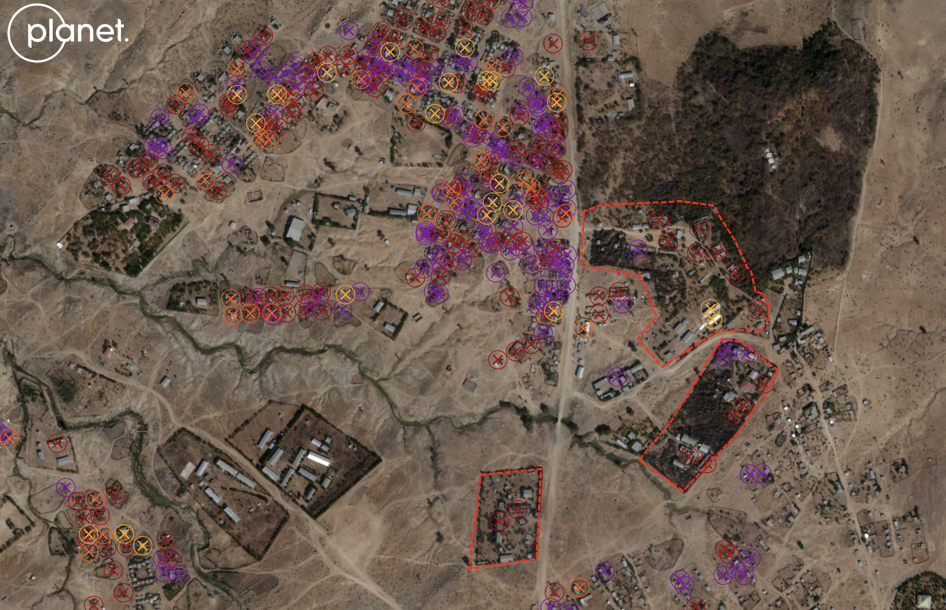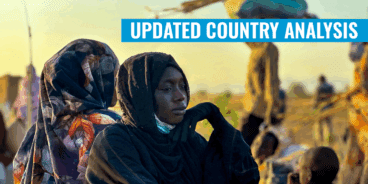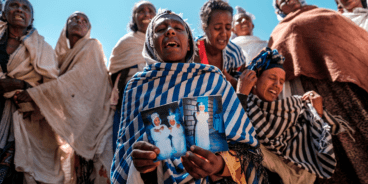

Atrocity Alert No. 239: Ethiopia, China and Iraq
Atrocity Alert is a weekly publication by the Global Centre for the Responsibility to Protect highlighting situations where populations are at risk of, or are enduring, mass atrocity crimes.
Satellite images reveal destruction of refugee camps in Tigray, Ethiopia
DX Open Network, a UK-based research organization, has released satellite images revealing the systematic destruction of two refugee camps in Ethiopia’s war-torn Tigray region. The images document the ongoing destruction, looting and razing of both Hitsats and Shimelba refugee camps, which previously hosted around 25,000 refugees, most of whom were from neighboring Eritrea.
According to DX Open Network’s analysis of the images, the camps appear to have been targeted between 24 November 2020 and 17 January 2021, despite their protected status under international law. The damage appears more extensive than previously reported, with over 1,000 structures destroyed or burned down, including schools, homes and food stores, as well as buildings operated by the World Food Programme, International Rescue Committee and the Norwegian Refugee Council. The Ethiopian government announced today that it is closing the two destroyed camps, stating one is an inhospitable location and the other is too close to the Eritrean border.
The UN High Commissioner for Refugees, Filippo Grandi, has stated that as many as 20,000 Eritrean refugees from Hitsats and Shimelba remain unaccounted for following the destruction of the camps. The satellite images reveal that military vehicles and troops were present near the camps at the time of their destruction. There are also numerous reports that refugees may have been forcibly returned to Eritrea.
Since the armed conflict in Tigray began on 4 November, UN officials and human rights organizations have reported widespread sexual violence, ethnic-based killing, forced displacement, attacks on children and other abuses. On 5 February the UN Special Adviser on the Prevention of Genocide, Alice Wairimu Nderitu, released a statement warning of the ongoing risk of further atrocities in Ethiopia, highlighting that hate speech and the stigmatization of ethnic Tigray, Amhara, Somali, and Oromo civilians must be addressed by the government.
The Global Centre for the Responsibility to Protect’s Communications and Digital Media Officer, Sarah Hunter, said, “attacks on refugee camps and humanitarian workers are prohibited under international law and may constitute war crimes. The international community must ensure accountability for these crimes, including by holding an urgent debate at the upcoming session of the UN Human Rights Council.”
Widespread and systematic sexual violence in Xinjiang detention camps
On 2 February the British Broadcasting Corporation (BBC) published shocking new evidence of widespread and systematic rape, sexual abuse and torture of detainees in China’s infamous “re-education” camps for Uyghurs (or Uighurs) and other Muslim minorities. The BBC’s reporting supports previous findings that the government of China is committing crimes against humanity and genocide against the Uyghur population in the Xinjiang region. In addition to human rights violations and abuses perpetrated inside the detention camps, the Chinese government has also engaged in the systematic destruction of Uyghur cultural heritage and is conducting a campaign to forcibly reduce birth rates amongst Uyghurs and other Muslim minorities.
Tursunay Ziawudun, a former detainee interviewed by the BBC, spent nine months in a camp where she was gang-raped on three occasions. According to Ziawudun, women were removed from the cells “every night” and raped by masked Chinese men. Other former detainees described being forced to assist guards in these abuses. Gulzira Auelkhan, a Kazakh woman who was detained for 18 months, recounted that, “my job was to remove their clothes above the waist and handcuff them so they cannot move.” The Chinese men “would pay money to have their pick of the prettiest young inmates,” she added.
A growing number of governments have condemned the persecution of the Uyghurs, including Australia’s Foreign Minister, Marise Payne, who called on China to provide the UN High Commissioner for Human Rights unrestricted access to Xinjiang province. In response to the BBC report, members of the Inter-Parliamentary Alliance on China – a cross-party organization of parliamentarians from around the world – called for a coordinated effort to hold China accountable for human rights violations and abuses in Xinjiang.
“While statements of condemnation are important, action aimed at holding the perpetrators accountable is urgently needed,” said Nadira Kourt, Program Manager at the Global Centre for the Responsibility to Protect. “All UN member states should support the establishment of an independent UN mechanism to investigate the situation in Xinjiang. Governments should also formally recognize that China is committing genocide and crimes against humanity and impose targeted sanctions on those overseeing this vast infrastructure of persecution.”
Mass burial of Yazidi genocide victims
On Saturday, 6 February, the remains of over 100 Yazidis killed by the so-called Islamic State of Iraq and the Levant (ISIL) in 2014 were returned to Kocho, in northern Iraq, and laid to rest by their families. The victims had been exhumed from mass graves excavated during 2019 by the UN Investigative Team to Promote Accountability for Crimes Committed by Da’esh/ISIL (UNITAD) and by the Iraqi government.
During August 2014 ISIL launched a campaign of atrocities across northern Iraq, systematically targeting ethnic and religious minority communities, including Yazidis, Christians, Shabak and Turkmen. A UN Commission of Inquiry later found that during ISIL’s attack on the Sinjar region, the group “committed the crime of genocide as well as multiple crimes against humanity and war crimes against the Yazidis.” This included killings, sexual slavery, enslavement, torture, forced conversion, and forcible transfer of children. In the village of Kocho alone, ISIL killed or enslaved approximately 1,200 Yazidis.
Six years since ISIL’s campaign in northern Iraq first began, the bodies of thousands of their victims are still to be exhumed, identified and returned to their families. No ISIL member has been held legally accountable in an Iraqi court for genocide or crimes against humanity perpetrated against the Yazidi. Instead, Iraqi courts have prosecuted (and executed) hundreds of captured ISIL members under broad counter-terrorism laws.
During the reburial ceremony, UN Special Adviser and Head of UNITAD, Karim A. A. Khan QC, said, “we must identify the living that are responsible for these acts and allow you – the victims, the survivors, the witnesses – your day in court to confront these perpetrators and allow judges to assess their criminal responsibility.”
All perpetrators of atrocities in Iraq, regardless of affiliation, should be held accountable through a credible and transparent legal process. The government of Iraq should adopt legislation that criminalizes genocide, war crimes and crimes against humanity in domestic law. The Iraqi government also needs international assistance to help address the psycho-social needs of all survivors of atrocity crimes, including sexual violence.
Related Content


Populations at Risk, November 2025
